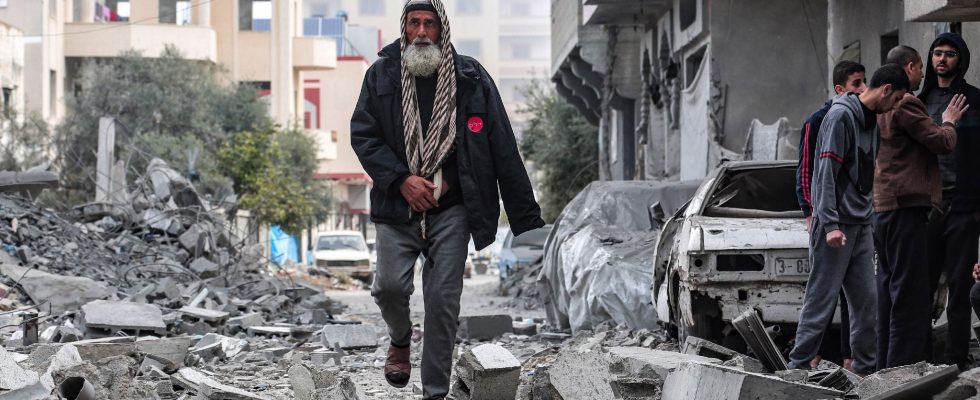More than 60 Palestinians died in Israeli night strikes on the Gaza Strip according to Hamas, a few hours before a meeting this Sunday, March 17, of Benjamin Netanyahu’s security cabinet focused on the next negotiations in Doha with a view to a possible truce.
Information to remember
⇒ Humanitarian aid is still insufficient in Gaza, deplores the WHO
⇒ New Israeli nighttime raids in the Gaza Strip
⇒ Benjamin Netanyahu meets his war cabinet on Sunday for truce negotiations
Netanyahu warns ‘international pressure’ won’t stop Rafah offensive
“No international pressure will prevent us from achieving all the objectives of our war” against the Palestinian movement Hamas, “we will act in Rafah, it will take a few weeks but it will take place,” said Israeli Prime Minister Benjamin Netanyahu at the start of the meeting of his government, according to a press release sent by his services.
New Israeli raids during the night
More than 60 Palestinians, including twelve from the same family, died in Israeli nighttime strikes on the Gaza Strip, according to Hamas. The home of this family was reportedly hit at dawn by bombs in the Bichara neighborhood of Deir al-Balah (center). In this locality, the raids were intense, as well as in Gaza City in the north and in the towns of Khan Younes and Rafah in the south, according to witnesses. Fierce fighting pitted Israeli soldiers and Palestinian fighters in Khan Younes and Gaza City.
More than five months after the start of the war between Israel and Hamas, the human toll continues to rise in Gaza with 31,645 deaths since October 7 according to Hamas – figures that cannot be verified by an independent source – and the threat of widespread famine according to the UN. Despite international pressure for a ceasefire, Israeli Prime Minister Benjamin Netanyahu is determined to continue the war and his army continues to bombard the cramped Palestinian territory it is besieging.
Netanyahu assembles his security cabinet
Faced with war, international mediators – the United States, Qatar, Egypt – are trying to secure a new humanitarian truce agreement, after that at the end of November. In vain so far. The Israeli security cabinet is due to meet at the end of the day to determine the “mandate” of the delegation which must go to Doha for further discussions.
Hamas said it was ready, in a new proposal, for a six-week truce, during which 42 hostages — women, children, the elderly and the sick — could be released in exchange for 20 to 50 Palestinian prisoners for each hostage released. The movement also calls for the “withdrawal of the army from all towns and populated areas”, the “return of the displaced” and the entry of at least 500 aid trucks per day into Gaza, said one of its officials. .
Within the Israeli government, Finance Minister Bezalel Smotrich, a leader of the extreme right, is opposed to sending this delegation. “Netanyahu must order […] the army to immediately enter Rafah and intensify military pressure until Hamas is destroyed.” Benjamin Netanyahu approved “action plans” for a ground offensive in Rafah, involving a “evacuation of the population,” his office said without further details.
Insufficient humanitarian aid
“In the name of humanity, we call on Israel not to move forward” in its operation against Rafah, declared Tedros Adhanom Ghebreyesus, head of the World Health Organization. In this city stuck on the closed border of Egypt and bombarded daily by the Israeli air force, there are more than 1.5 million Palestinians, including many displaced people.
According to the UN, “widespread famine” is now almost “inevitable” in the Gaza Strip. Israel controls the entry of land aid, which remains very insufficient compared to the needs of the 2.4 million inhabitants. Alternative routes are being put in place by sea and air to try to deliver aid.
After a first delivery of food from the boat of the Spanish NGO Open Arms, a second aid boat is ready to leave, according to Cyprus. In addition, several Arab and Western countries continued to airdrop food into Gaza. But for the UN, aid by land is vital.
